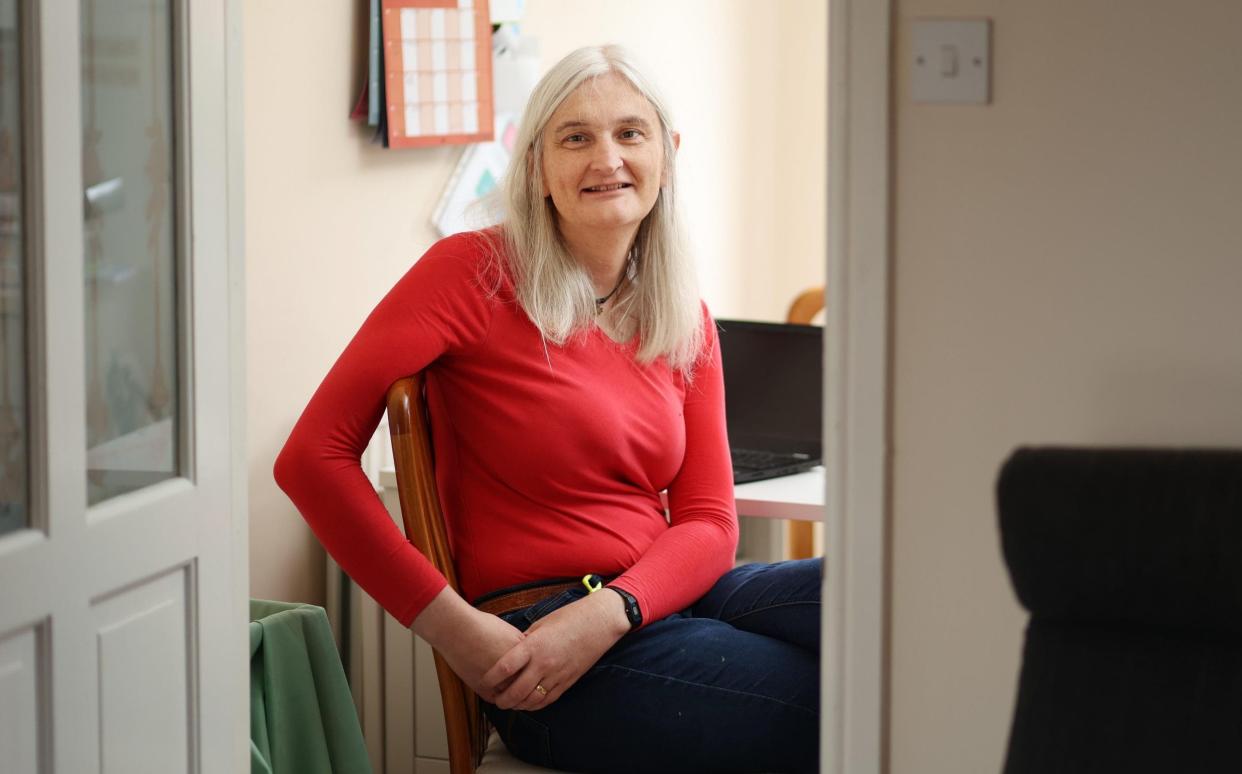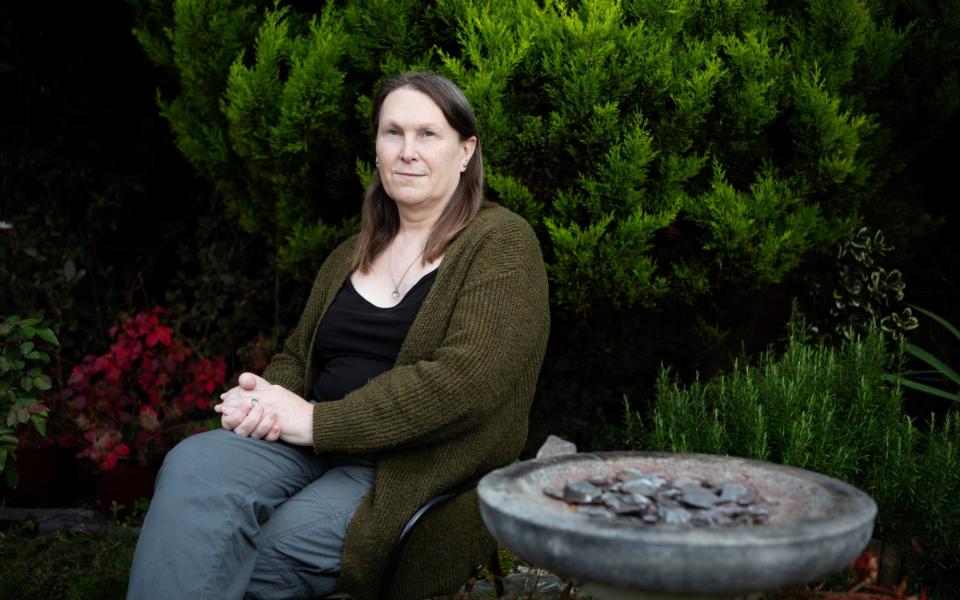The trans women who support women's rights

- Oops!Something went wrong.Please try again later.
“They remind me of football hooligans in the 1980s,” reflects Debbie Hayton, of the trans activists who have this week been engaged in a high-profile battle with Sussex University to have Professor Kathleen Stock sacked from her post in the philosophy department because she insists sex is a biological fact. “They are like a tribe,” says Hayton, “and everyone else is the enemy.”
As a trans woman herself, 53-year-old Hayton might be expected to have sympathy with the outcry against Stock (which includes threats of violence). Or the recent campaigns mounted by what is often referred to as the ‘trans lobby’ (made up of trans people and those who describe themselves as “allies”) against author JK Rowling and Labour MP Rosie Duffield, who have questioned whether you can choose your sex.
She might even have been cross with Professor Robert Winston, who this week told the BBC’s Question Time that “you can’t change sex” as he supported Stock.
But Hayton feels differently. This week, she assembled 15 other trans women as signatories to a letter to a national newspaper, condemning the attacks on Stock as “appalling”. The letter described her treatment as “an unprincipled campaign of harassment and abuse”, disowned the protestors’ claim to be acting in defence of their rights, and made plain that “trans people, like any other group, hold a range of opinions”.
All knew in putting their heads above the parapet that they risked a backlash from the activists. In Hayton’s case, what she describes as her apostasy from the “group mentality” of the trans lobby has already seen this science teacher and union activist face expulsion from the TUC’s LGBT committee for wearing a T-shirt emblazoned with the words: ‘Trans Women Are Men. Get Over It.’
After transitioning from male to female in 2012, Hayton’s own surgery came four years later, when she was married and the father of three children, now 24, 21 and 19. It was, she says succinctly, a “difficult time for the family”, and in particular for her wife, with whom she still lives in Bristol.
Hayton had struggled with her gender as a child, she recalls, “but it wasn’t overwhelming. There were bigger things that I was struggling with in life. It was only when I realised that others were transitioning that I thought I could do it too. It was self-centred.”
And transitioning, she says, hasn’t made her internal struggles any easier. “I sometimes describe it today as a palliative solution to a psychological distress,” she adds.
Observing the scenes on the Sussex University campus has been upsetting, she reports, not least because she regards Stock – whom she has met on several occasions – as “someone measured, balanced and reasonable”.
Her fellow signatory, Miranda Yardley, echoes Hayton’s high opinion of Stock’s work, quoting approvingly from her recent book, Material Girls. It is, he emphasises (Yardley prefers masculine pronouns for himself out of respect for biological women), a book that supports the rights of trans people rather than trashes them.
What motivated Yardley, an Essex-based accountant, whose transition was in 2008, to sign the letter was first and foremost his fears about freedom of speech. “I don’t agree with people’s right to express an opinion being challenged,” he says, “to the point where there are some opinions that people – and in this debate it is usually women – are unable to state publicly about the material reality of biological sex.”

The threat isn’t just to one academic, he maintains, but to democracy itself and so should be a cause of concern for all. “This takes us into a world where people will be unable to express, discuss and even argue over opinions,” he adds.
Like Hayton, Yardley, 53, knows all about the lengths trans activists will go to silence challenges to what he refers to as “incoherent arguments” about “gender ideology” – the idea that everyone should be free to identify as whatever sex they choose, regardless of their biology (something that under the SNP-Green coalition agreement could soon become law in Scotland).
In the face of complaints against Yardley expressing his views about the unchanging nature of trans women’s male biology, he was banned from Twitter as “transphobic”, and was taken to court on similar grounds by a woman who is a transgender activist. The court apparently saw the irony of the charge, and Yardley won the case.
“I sometimes describe myself as ‘the world’s most hated transsexual’,” he says, with an unrepentant laugh. “The hostility comes from those who claim loudly to be trans ‘allies’, but who are tyrants who want to censor my opinions.”
Growing up, Yardley recalls, he did face prejudice, “but from the moment as a child when I heard about transsexuals, I knew it applied to me”. There followed years of confusion, and a decade of therapy. “I was working out if I could get through the process without damaging myself and the people around me.” His experience has made Yardley – like Hayton – a vocal advocate of greater provision of therapy and counselling for youngsters who feel drawn to transitioning, and of much less haste in “medicalising” them, an issue recently highlighted by the legal challenge Keira Bell is pursuing against the NHS Tavistock and Portman Trust in London for prescribing her puberty blockers in her early teens as a preface to gender reassignment surgery at 16.
Paramedic Kristina Harrison, another signatory to the letter, believes the events at Sussex University provide an insight into a bigger campaign – in institutions, in businesses, in government departments, and even the medical establishment – where, under pressure from well-organised trans activists, including Stonewall, “gender ideology” is being allowed to displace science.
Harrison, 56, who lives in Berkshire with her civil partner and who transitioned in her late 30s, quotes as evidence of the normalisation of gender ideology, the medical journal The Lancet, which recently described women on its front page as “bodies with vaginas” (but later apologised for the wording).

While Harrison, Hayton and Yardley are hardened to the attacks of other trans people with different views who want to silence them, all worry how the activists’ behaviour is disproportionately affecting high profile [biological] women who, such as Stock, dare publicly to question gender self-identification.
“I want to make clear as a trans woman,” says Harrison, “that I understand and respect women’s wish to maintain their hard-won rights – for example, to safe women-only spaces away from males, regardless of their gender identity and presentation.
“I would like to see ‘third spaces’ provided – for instance, alongside men’s and women’s toilets or changing rooms – not just for trans women like me, but for all those who prefer a gender neutral facility.”
These are the real changes to campaign for, she believes, along with improved mental health facilities, not silencing of academics. Yet speaking out means Harrison has received threats from activists to challenge her clinical registration as a paramedic on the grounds that her views on biology – as against gender self-identification – make her unfit to practise.
“This sort of intimidation will put back all the progress that has been made,” she says, “in attitudes to trans people. All that will come out of the hatred and intolerance we are seeing from activists at Sussex is more hatred and intolerance directed towards trans people.”

